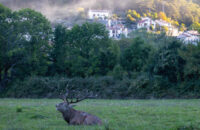The A24 and A25 highways plow through Abruzzo’s landscapes of rare beauty, lands that nourished the soul of a unique and unforgettable artist: Ivan Graziani. A multifaceted singer-songwriter, virtuoso guitarist and narrator of intense stories, Graziani was able to immortalize in his songs the essence of this region, its roots and atmospheres. An indissoluble bond that is still alive and vital today, as evidenced by the deep affection for him of another Italian music talent, Lucio Corsi, who is soon to star in theEurovision Song Contest.
Born in Teramo on October 6, 1945, Ivan Graziani manifested a strong passion for music from a young age, learning to play guitar and cultivating an original compositional talent. After his first musical experiences with the Fratelli Grimm group, he embarked on a solo career in the early 1970s, immediately marking the scene with an unmistakable style that mixes rock, blues and folk influences, with lyrics that are often ironic, surreal and deeply human. His debut album, “La città che io vorrei” (1973), introduced him to the general public, but it was with subsequent works that his stylistic signature was fully defined. Albums such as “Ballata per quattro stagioni” (1976), “I Lupi” (1977) with the iconic “Lugano addio”,“Pigro” (1978) containing “Monna Lisa” and “Scappo di casa” until “Agnese dolce Agnese” (1979) , which includes the hit of the same name, consecrated him as one of the most original and appreciated singer-songwriters on the Italian scene. His music, characterized by a powerful sound and a scratchy voice, stands out for its ability to tell everyday stories with poetic language and a vein of melancholic irony.
The connection with Abruzzo
His military service in the Chieti district represents a formative and inspirational experience. From those memories takes shape “Arcipelago Chieti,” a book that reveals a previously unseen side of Graziani, that of a keen observer and witty storyteller of human dynamics.
Abruzzi’s roots have always been proudly claimed by the singer-songwriter, even going so far as to say that rock would be born in Abruzzo: “Rock was born in Abruzzi, not because I am Abruzzese, but because in the second half of the nineteenth century in America there were more Abruzzese than Indians. Because the Abruzzese have a very important thing musically speaking, which is the saltarello, which has the basis of a beating guitar, a typical rock rhythm. And so, because Americans have never invented anything and never will, they got the black part from the blacks and they got the white part from us Abruzzese. That’s why, when someone attacks me and says: but you treat Americans and English people badly, yet you play rock & roll; I simply reply that I am playing my music.”
Ivan Graziani’s connection with his land is constantly present in his work. Songs such as “Gran Sasso” or “Lullaby of Man,” composed in dialect, become true tributes to his region. In “Gran Sasso,” in particular, the majesty of Abruzzo’s iconic mountain becomes a metaphor for strength, eternity and refuge, a visceral bond that shines through in every verse and every note. The piece is a heartfelt ode to a landscape that has nurtured his imagination and his art.
Despite a discography full of gems and a devoted following, Ivan Graziani’s recording fortunes have not always coincided with the big numbers of mainstream pop. However, his artistic integrity and stylistic consistency have made him a cult figure, an artist respected by his peers and who, decades after his passing, has left a deep furrow in music history, rediscovered every day by new listeners who recognize his authenticity and depth. Albums such as “Snoopy” (1981), “Ivan Graziani” (1983) and “Picasso” (1986) testify to his continuous musical evolution and his ability to experiment without ever betraying his identity.
His legacy in the Italy of the new millennium
His untimely death in 1997 left an unbridgeable void in the Italian music scene, but his artistic legacy lives on through his songs and the many tributes dedicated to him. In Teramo and other places in Abruzzo, concerts, exhibitions and cultural initiatives keep his memory alive, celebrating an artist who knew how to tell the story of his land with passion and originality.
Today, the echo of his music resonates with particular intensity in the words of Lucio Corsi, a young singer-songwriter from Maremma who has made Ivan Graziani a key reference point. His affectionate remembrance and heartfelt interpretation of Graziani’s songs testify to the intrinsic strength of a work that transcends regional and generational boundaries. “Ivan was introduced to me by my father in the car as a child. He scared me, I was six years old. He would start ‘when the wolves come’ … that particular voice of his struck terror in me. That feeling made him enter my heart, and over the years he never left.”
Corsi’s deep admiration translates into an almost filial longing: “Ivan’s songs, all of Ivan’s songs, I wish I had written them. But I’m glad he wrote them, because it’s beautiful to hear him sing.” A continuity also recognized by Ivan’s real son, Filippo Graziani, who has been cultivating his father’s musical legacy for more than a decade, creating new arrangements on his repertoire, and who in March began from the Manzoni Theater in Milan a tour to celebrate what would have been the Teramo singer-songwriter’s 80th birthday. ” In my opinion, one of the most akin to him and his songs is Lucio Corsi, also because of that provincial dimension in which the songs he writes are immersed,” said Filippo .
With his participation in Eurovision, Lucio Corsi brings with him not only the colors of Italy but also a piece of that rock soul of Abruzzo, a vibrant tribute to a singer-songwriter who knew how to transform the mountains of Gran Sasso and the stories of its people into eternal music. Driving along the A24 and A25 highways in the company of Ivan’s music and words thus becomes a journey not only through breathtaking landscapes, but also through the notes of an artist who knew how to sing Abruzzo with a visceral love and unquestionable talent.







